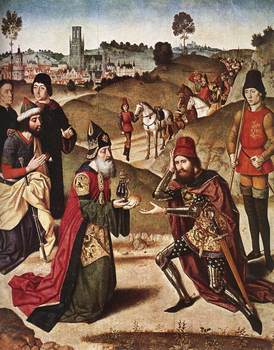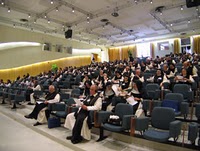 Prayers are requested for the members of the General Chapters of the Cistercian monks and the Dominican Friars who begin their meetings today in Rome. In the coming days both Chapters will deal the Order’s business and hold an election for new leadership: the Cistercians will elect a new Father General and the Dominicans a Master General.
Prayers are requested for the members of the General Chapters of the Cistercian monks and the Dominican Friars who begin their meetings today in Rome. In the coming days both Chapters will deal the Order’s business and hold an election for new leadership: the Cistercians will elect a new Father General and the Dominicans a Master General.
Blessed Alfredo Ildefonso Schuster
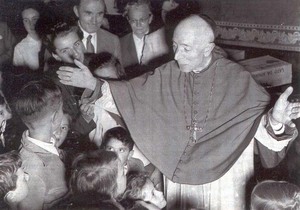 Almighty God, through Your grace, Blessed Alfredo Ildefonso, by his exemplary virtue built up the flock entrusted to him. Grant that we, under the guidance of the Gospel, may follow his teaching and walk in sureness of life, until we come to see You face to face in Your eternal kingdom.
Almighty God, through Your grace, Blessed Alfredo Ildefonso, by his exemplary virtue built up the flock entrusted to him. Grant that we, under the guidance of the Gospel, may follow his teaching and walk in sureness of life, until we come to see You face to face in Your eternal kingdom.
Alfredo Ludovico Luigi Schuster was born in Rome of Bavarian immigrants on January 18, 1880. At 11 years old he entered the Benedictine Abbey of Saint Paul outside the Walls taking the name Ildefonso in 1896; he professed solemn vows in 1902. Philosophy studies was done at Sant’Anselmo and theology was studied at Saint Paul’s where he was ordained a priest on March 19, 1904.
Service to the monastic way of life, besides the daily opus Dei (the praying of the Divine Office), included scholarship, novice master for 8 years, prior of the for 2 years, procurator of the Cassinese Congregation of the Benedictine monks for 12 years and abbot-ordinary of Saint Paul outside the Walls from 1918 until 1929. He was President of the Pontifical Oriental Institute from 1919 to 1922.
On June 26, 1929, Pope Pius XI nominated him the Archbishop of Milan and a few weeks later created him a cardinal on July 15. In 1933, the Order of Malta honored Schuster with the Grand Cross for his service to the Church.
Cardinal Schuster died of natural causes on August 30, 1954. In 1957, Cardinal Giovanni Montini –later Pope Paul VI– introduced Schuster’s cause for canonization. It is said that upon opening Schuster tomb on January 28, 1985, his was incorrrupt; he beatied on May 12, 1996 by Pope John Paul II.
Days before Blessed Ildefonso died he said: “You want something to remember be by. All I can leave you is an invitation to holiness….”
Abbot Thomas Confroy, RIP
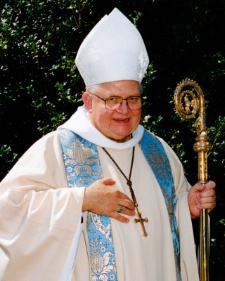 A week ago today the monastic community of St Mary’s Abbey (Morristown, NJ), indeed the Church, lost a faithful monk, priest, abbot and friend. Abbot Thomas Confroy made his final passover to the Lord, his Destiny at the abbey on August 23. News of Abbot Thomas’ death can be read here.
A week ago today the monastic community of St Mary’s Abbey (Morristown, NJ), indeed the Church, lost a faithful monk, priest, abbot and friend. Abbot Thomas Confroy made his final passover to the Lord, his Destiny at the abbey on August 23. News of Abbot Thomas’ death can be read here.
- Sundays: St Mary’s Abbey, especially those in most need of strength;
- Mondays: those in religious life;
- Tuesdays: the faithful departed and the poor souls in purgatory;
- Wednesdays: his natural family and special requests made to him;
- Thursdays: the pope, cardinals, bishops, suffering priests, deacons, pastoral ministers, seminarians and vocations to the priesthood;
- Fridays: for missionaries
- Saturdays: for himself, for forgiveness if any of his actions harmed others spiritually or emotionally.
Maciel’s ghost still won’t rest
Sandro Magister, a Rome-based Vaticanista, published an essay today on his blog, “Maciel’s Ghost Still Haunts the Castle” talking about the levels of challenge the Legionaries of Christ face, not least is the cult of personality of their founder, the late Father Marciel Maciel. Mr. Magister also includes a recently written letter of a priest of the Legion, Father Peter Byrne, LC, who exposes some of the dark side of his congregation. The anguish of this priest is well communicated.
New Haven’s Communion & Liberation
Saint Augustine of Hippo
The gives to us today in the Office of Readings the following from the Confessions of Saint Augustine of Hippo, whose feast we celebrate today. These are some of the most moving words of the great Augustine! If you have not read the Confessions I urge you to do so; I have always felt thus, so much so that when I taught high school junior theology I had my students read significant sections of the work.
Urged to reflect upon myself, I entered under your guidance
the innermost places of my being; but only because you had become my helper was
I able to do so. I entered, then, and with the vision of my spirit, such as it
was, I saw the incommutable light far above my spiritual ken and transcending
my mind: not this common light which every carnal eye can see, nor any light of
the same order; but greater, as though this common light were shining much more
powerfully, far more brightly, and so extensively as to fill the universe. The
light I saw was not the common light at all, but something different, utterly
different, from all those things. Nor was it higher than my mind in the sense
that oil floats on water or the sky is above the earth; it was exalted because
this very light made me, and I was below it because by it I was made. Anyone who
knows truth knows this light.
O eternal Truth, true Love, and beloved
Eternity, you are my God, and for you I sigh day and night. As I first began to
know you, you lifted me up and showed me that, while that which I might see
exists indeed, I was not yet capable of seeing it. Your rays beamed intensely
on me, beating back my feeble gaze, and I trembled with love and dread. I knew
myself to be far away from you in a region of unlikeness, and I seemed to hear
your voice from on high: “I am the food of the mature: grow, then, and you shall
eat me. You will not change me into yourself like bodily food; but you will be
changed into me”.
Accordingly I looked for a way to gain the strength I needed
to enjoy you, but I did not find it until I embraced the mediator between God
and man, the man Christ Jesus, who is also God, supreme over all things and
blessed for ever. He called out, proclaiming I am the Way and Truth and the
Life, nor had I known him as the food which, though I was not yet strong enough
to eat it, he had mingled with our flesh, for the Word became flesh so that
your Wisdom, through whom you created all things, might become for us the milk
adapted to our infancy.+Late have I loved you, O Beauty ever ancient, ever new,
late have I loved you! You were within me, but I was outside, and it was there
that I searched for you. In my unloveliness I plunged into the lovely things
which you created. You were with me, but I was not with you. Created things
kept me from you; yet if they had not been in you they would not have been at
all. You called, you shouted, and you broke through my deafness. You flashed,
you shone, and you dispelled my blindness. You breathed your fragrance on me; I
drew in breath and now I pant for you. I have tasted you, now I hunger and
thirst for more. You touched me, and I burned for your peace.
Friends are a path to God
Saint Monica
Remembering Saint Monica, mother of the great Saint Augustine of Hippo today, I re-read the account Augustine gave of his mother’s death and his tribute to her in the Confessions (9.12). The intimacy Augustine portrays between he and God and he and his mother is beautiful and very striking. Truly, grace at work.
Augustine writes of his mother:
I closed her eyes; and there flowed in a great sadness on my heart and it was passing into tears, when at the strong behest of my mind my eyes sucked back the fountain dry, and sorrow was in me like a convulsion. As soon as she breathed her last, the boy Adeodatus burst out wailing; but he was checked by us all, and became quiet. Likewise, my own childish feeling which was, through the youthful voice of my heart, seeking escape in tears, was held back and silenced. For we did not consider it fitting to celebrate that death with tearful wails and groanings. This is the way those who die unhappy or are altogether dead are usually mourned. But she neither died unhappy nor did she altogether die. For of this we were assured by the witness of her good life, her “faith unfeigned,” and other manifest evidence.
What was it, then, that hurt me so grievously in my heart except the newly made wound, caused from having the sweet and dear habit of living together with her suddenly broken? I was full of joy because of her testimony in her last illness, when she praised my dutiful attention and called me kind, and recalled with great affection of love that she had never heard any harsh or reproachful sound from my mouth against her. But yet, O my God who made us, how can that honor I paid her be compared with her service to me? I was then left destitute of a great comfort in her, and my soul was stricken; and that life was torn apart, as it were, which had been made but one out of hers and mine together.
When the boy was restrained from weeping, Evodius took up the Psalter and began to sing, with the whole household responding, the psalm, “I will sing of mercy and judgment unto thee, O Lord.” And when they heard what we were doing, many of the brethren and religious women came together. And while those whose office it was to prepare for the funeral went about their task according to custom, I discoursed in another part of the house, with those who thought I should not be left alone, on what was appropriate to the occasion. By this balm of truth, I softened the anguish known to thee. They were unconscious of it and listened intently and thought me free of any sense of sorrow. But in thy ears, where none of them heard, I reproached myself for the mildness of my feelings, and restrained the flow of my grief which bowed a little to my will. The paroxysm returned again, and I knew what I repressed in my heart, even though it did not make me burst forth into tears or even change my countenance; and I was greatly annoyed that these human things had such power over me, which in the due order and destiny of our natural condition must of necessity happen. And so with a new sorrow I sorrowed for my sorrow and was wasted with a twofold sadness.
So, when the body was carried forth, we both went and returned without tears. For neither in those prayers which we poured forth to thee, when the sacrifice of our redemption was offered up to thee for her — with the body placed by the side of the grave as the custom is there, before it is lowered down into it — neither in those prayers did I weep. But I was most grievously sad in secret all the day, and with a troubled mind entreated thee, as I could, to heal my sorrow; but thou didst not. I now believe that thou wast fixing in my memory, by this one lesson, the power of the bonds of all habit, even on a mind which now no longer feeds upon deception. It then occurred to me that it would be a good thing to go and bathe, for I had heard that the word for bath [balneum] took its name from the Greek balaneion, because it washes anxiety from the mind. Now see, this also I confess to thy mercy, “O Father of the fatherless”: I bathed and felt the same as I had done before. For the bitterness of my grief was not sweated from my heart.
Then I slept, and when I awoke I found my grief not a little assuaged. And as I lay there on my bed, those true verses of Ambrose came to my mind, for thou art truly,
“Deus, creator omnium,
Polique rector, vestiens
Diem decoro lumine,
Noctem sopora gratia;
Artus solutos ut quies
Reddat laboris usui
Mentesque fessas allevet,
Luctusque solvat anxios.”
“O God, Creator of us all,
Guiding the orbs celestial,
Clothing the day with lovely light,
Appointing gracious sleep by night:
Thy grace our wearied limbs restore
To strengthened labor, as before,
And ease the grief of tired minds
From that deep torment which it finds.”
And then, little by little, there came back to me my former memories of thy handmaid: her devout life toward thee, her holy tenderness and attentiveness toward us, which had suddenly been taken away from me — and it was a solace for me to weep in thy sight, for her and for myself, about her and about myself. Thus I set free the tears which before I repressed, that they might flow at will, spreading them out as a pillow beneath my heart. And it rested on them, for thy ears were near me — not those of a man, who would have made a scornful comment about my weeping. But now in writing I confess it to thee, O Lord! Read it who will, and comment how he will, and if he finds me to have sinned in weeping for my mother for part of an hour — that mother who was for a while dead to my eyes, who had for many years wept for me that I might live in thy eyes — let him not laugh at me; but if he be a man of generous love, let him weep for my sins against thee, the Father of all the brethren of thy Christ.
Crossroads Cultural Center
 There are a few good opportunities to take our lives seriously. One such opportunity is the Crossroads Cultural Center that looks “to offer opportunities for education, making it possible to look with openness, curiosity and critical judgment at every aspect of reality.” Crossroads takes Saint Paul’s exhortation to “test everything; retain what is good” with
There are a few good opportunities to take our lives seriously. One such opportunity is the Crossroads Cultural Center that looks “to offer opportunities for education, making it possible to look with openness, curiosity and critical judgment at every aspect of reality.” Crossroads takes Saint Paul’s exhortation to “test everything; retain what is good” with
Melchizedek, the righteous King of Salem
The Roman Martyrology lists one of the saints for today as Melchizedek, the righteous King of Salem who offered bread and wine to God in worship. Melchizedek means the King of Justice or King of Peace; “Salem” is the root word for Jerusalem. Melchizedek is also remembered in the Roman Canon of the Mass when the priest prays, “…according to the order of Melchizedek.” The Church’s commemoration of this mysterious King of Salem reminds us that Melchizedek is a bridge between the Old and New Testaments; he is the first priest of the Old Testament mentioned in sacred Scripture and St. John Chrysostom even speaks of the King as “the perfect image of the Savior,” that is, he’s an Old Testament type, a foreshadowing of Jesus Christ as priest and king.
In a homily Bishop Photius of Lyons in part says of Melchizedek:
St. John Chrysostom says:
“Melchizedek was righteous and the faithful image of Christ. Moved
by a prophetic spirit, he discerned the oblation which must one day be offered
for the Gentiles, and, in the example of the future Christ, he offered bread
and wine as sacrifice to God. But, the Judaic synagogue, which honored
God according to the order of Aaron, offered Him a sacrifice, not of bread and
wine, but of bulls and lambs and glorified the Lord by bloody sacrifices.
That is why God, addressing Himself to the One Who was to be born of the Virgin
Mary, Jesus Christ, His Son, says to Him, `You are Priest forever according to
the order of Melchizedek’ and not according to the order of Aaron, who honors
his God while offering Him bulls and heifers” (Op. cit.,
p.482-483). St. Ambrose draws the conclusion that the Christian worship
is more ancient than that of the Law since it is Melchizedek, the image of
Christ, who brings the bread and the wine, not Abraham (Cf “Dictionnaire
de Spiritualite”, col. 971. St. Ambrose, “De Sacramentis”,
IV, 8, 10-11; “De Mysteriis”, 8, 44-45).
That the figure of
Melchizedek is fulfilled in the Lord Jesus Christ, the Fathers all hold to the
fact that He alone is truly `without genealogy’: “The Son of God,”
says St. John Chrysostom, “is without father and without mother; without father
as to His earthly genesis; without mother as to His heavenly genesis”
(“Homelie sur Melchizedek”, op. cit., p.479. Cf. also
“Expication des Psaumes”, Ps. CIX, ibid., p.332). If then the
Scriptures say of Melchizedek that he was `without genealogy’, it is not at all
that in reality he did not have parents, “because”, says St. John
Chrysostom, “we maintain that Melchizedek is not only a man like us . .
. but as Melchizedek was the type of Christ, Whose image he bore, in the
same way was Jonas. The Scriptures had not spoken of his father, so that
he might offer us a perfect image of the Saviour Who alone, in truth, has
neither father nor genealogy” (Ibid., p.482). Likewise, in his
homily on the Psalm of David, he says: “That which Melchizedek was in figure,
Jesus Christ was in reality, and the name of Melchizedek was like the names of
Jesus and of Christ, which long in advance announced and prefigured the mission
of the Saviour. When we read that Melchizedek had neither beginning nor
end of his life, it is not that in reality he had had neither beginning nor
end, but because no trace is found of his genealogy. Jesus, on the
contrary, had in truth no beginning of His days, nor end of His life. His
existence had no time, no beginning, no end. One was the figure, the other
the truth” (Id.,”Oeuvres Completes”, t.IX, p.332).
Blessed John Henry Newman was enchanted by the mysteriousness of the priest and king Melchizedek who composed a poem, “Melchizedek”:
Without father, without mother, without descent; having neither beginning of days, nor end of life.
Thrice bless’d are they, who fell their lonliness;
To whom nor voice of friends nor pleasant scene
Brings that on which the sadden’d heart can lean;
Yea, the rich earth, garb’d in her daintiest dress
Of light and joy, doth but the more oppress,
Claiming responsive smiles and rapture high;
Till, sick at heart, beyond the veil they fly,
Seeking His Presence, who alone can bless.
Such, in strange days, the weapons of Heaven’s grace;
When, passing o’er the high-born Hebrew line,
He forms the vessel of His vast design;
Fatherless, homeless, reft of age and place,
Sever’d from earth, and careless of its wreck,
Born through long woe His rare Melchizedek.
Nicholson & Lee, eds. The Oxford Book of English Mystical Verse, 1917.



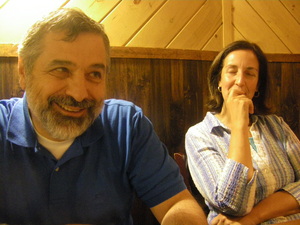

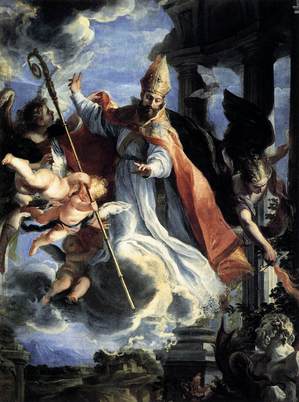
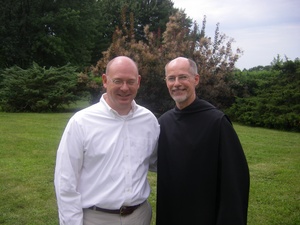
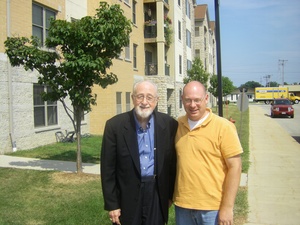
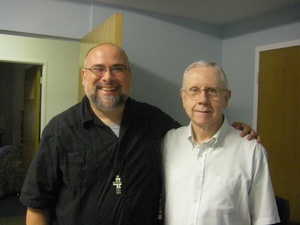
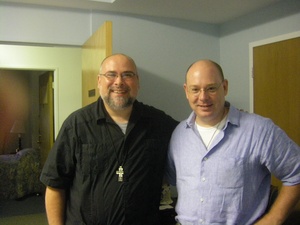
![St Monica Andrea Verrocchio[1].jpg](https://communio.stblogs.org/assets_c/2010/08/ St Monica Andrea Verrocchio[1]-thumb-285x343-7110.jpg)
